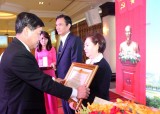Forum on Vietnam’s economy after 30 years of reform held in Singapore
International scholars from all over the world gathered in Singapore on April 7-8 for the Vietnam Forum 2016 to discuss Vietnam’s economic achievements and challeges after 30 years of reform.
Participants to the forum, which was organised by the Institute of Southeast Asian Studies, focused on four main areas - economy, politics, culture and society, and foreign policies; and pointed out challenges Vietnam needs to address to keep its momentum.
Tan Chin Tiong, ISEAS Director, highlighted some important economic achievements in the past 30 years. Between 1990-2014, Vietnam’s economy grew, on average at 6.8 percent annually, to become a medium per capita income country in 2009.
The rate of poor households was dramatically reduced from 58.1 percent in 1993 to 11.1 percent in 2012. The total foreign direct investment capital flowing into the country accumulated to 290.6 billion USD at the end of 2014, while the total export-import value reached 298 billion USD.
Despite the progress Vietnam has made, the country still has a lot of challenges ahead that need to be addressed, if it is to maintain its economic successes in the future.
Relating to those challenges, Professor Adam Forde, from the Victoria Institute of Strategic Economic Studies in Australia, said Vietnam has many opportunities to maintain its impressive achievements if the government ensures the continued enforcement of its policies.
Scholars also touched upon many other issues including the development of the private economic sector and the reform of state-owned enterprises. They agreed that Vietnam needs to do these to maintain sustainable growth.
According to Associate Prof. Konstantin M Wacker from the Faculty of Economy at Germany’s Gutenberg University, one of biggest challenges Vietnam faces is the modification of its regulations in line with international commitments it has signed such as the Trans-Pacific Partnership, as well as to fulfil the requirements of the World Trade Organisation.
Participants at the forum also discussed Vietnam's politics and foreign policy.
VNA
 Ben Cat concentrates efforts to fulfill socio-economic development targets
Ben Cat concentrates efforts to fulfill socio-economic development targets
 Forstering a logistics center with regional connection
Forstering a logistics center with regional connection
 To clear bottlenecks, make good use of FTAs
To clear bottlenecks, make good use of FTAs
 Vietnam balances supply and demand to prepare for Tet shopping season
Vietnam balances supply and demand to prepare for Tet shopping season
 Developing Bac Tan Uyen district into a town in the period 2030-2040
Developing Bac Tan Uyen district into a town in the period 2030-2040
 Accompanying investors for sustainable development
Accompanying investors for sustainable development
 Tan Uyen: Flexible adaptation, stable growth
Tan Uyen: Flexible adaptation, stable growth
 Tax revenue management boosted and modernized
Tax revenue management boosted and modernized
 To build synchronous infrastructure, facilitate new era development
To build synchronous infrastructure, facilitate new era development
 Bau Bang aims to become a center of innovation and industry
Bau Bang aims to become a center of innovation and industry







